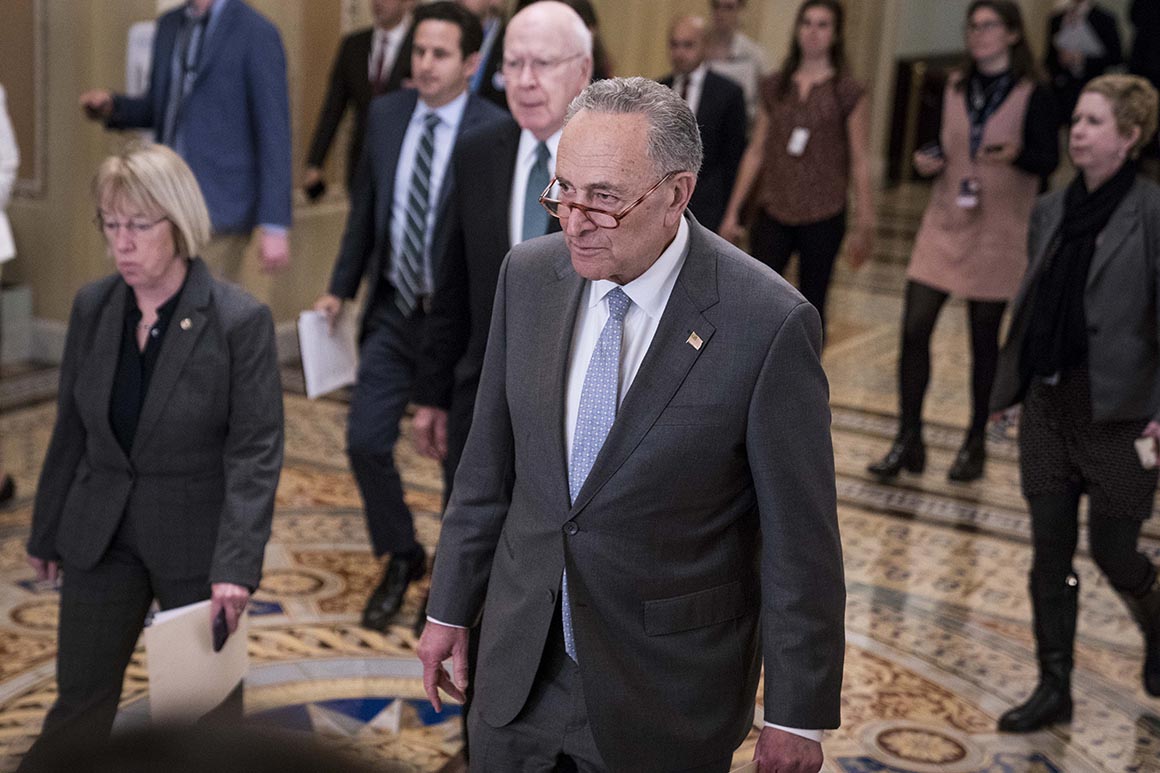
This time around, Democrats again faced withering criticism from the GOP. Yet Schumer and his Senate Democrats held out for a deal that delivered billions of dollars for hospitals, testing and underbanked businesses. Still, the ultimate agreement fell short of the ambitions initially laid out by Schumer and Speaker Nancy Pelosi; it did not include $150 billion for struggling state and local governments to deal with the coronavirus fallout.
Whether Democrats got enough out of their fights will be dissected for weeks and months to come. Already, progressives are furious that the party relented on some of its demands and kicked those battles until the next brouhaha with McConnell.
What’s less debatable is that after three years under Trump’s presidency, Senate Democrats are more comfortable than ever blocking emergency legislation and then holding the line. In the past 13 months, Democrats have stopped a Puerto Rico aid bill, a popular defense bill and two coronavirus relief bills before winning changes and then passing them.
The Senate minority plays a critical role in Washington’s balance of power because of the supermajority threshold used to pass most legislation. McConnell himself became a master of using the filibuster to shut down Democrats’ priorities and extract concessions on big fiscal deals when Barack Obama was president.
The GOP’s hard line didn’t cost them. Republicans took full control of Congress after the 2014 midterms and made McConnell majority leader, with Trump winning the White House two years later.
Schumer denied he was pursuing the same tactics during the Trump administration that Republicans wielded against Obama: “No. What we’re doing is on the substance. We’re right, and we believe in it strongly.”
Other Democrats also dismiss such comparisons, even if Republicans scoff. Sen. Ted Cruz (R-Texas), a master of blocking Democratic bills in the Obama era, accused Democrats of “holding small businesses and employees hostage in order to push through their partisan agenda.”
“It’s not just in our nature to be obstructionist for the sake of being obstructionist. … It’s not that we’re trying to play the same game,” countered Sen. Chris Murphy (D-Conn.). “There’s just unanimity in the caucus about what needs to be done and what has been lacking in the initial Republican proposals.”
The dynamics of Washington have also changed dramatically from two years ago, when the aborted government shutdown provoked rage among liberals and some congressional Democrats when the party folded so quickly. Schumer’s caucus is now backed up by a Democratic House majority and he has just two truly vulnerable Senate incumbents this year compared with 2018, when 10 Democratic senators from states that Trump won were up for reelection.
Still, it’s remarkable how comfortable Senate Democrats have become while taking days of incoming from the GOP on charges of obstruction. Even former Small Business Administrator Karen Mills, who served under Obama, questioned their strategy.
But Democrats said they established their negotiating position at nearly the same time that McConnell made his move to try and push through the $250 billion for small businesses. Democrats promptly blocked McConnell, who then rejected their alternative. That stalemate held for more than a week.
On April 7, Senate Democrats held a conference call in which senators like Joe Manchin of West Virginia and Martin Heinrich of New Mexico said they couldn’t just fork over that money without changes to the program, according to a person on the call.
Source: politico.com
See more here: news365.stream






